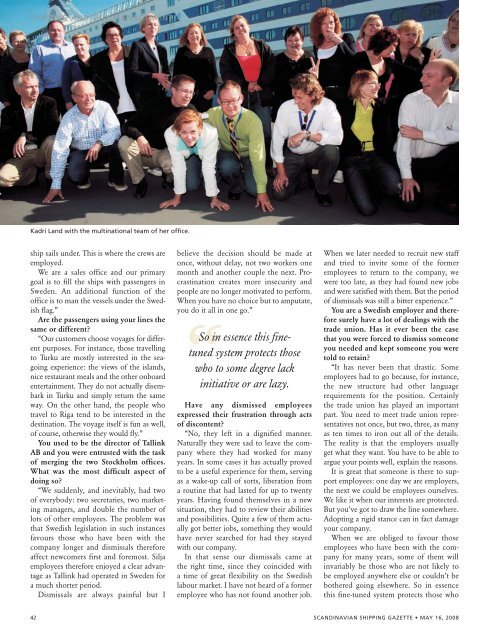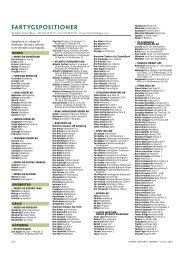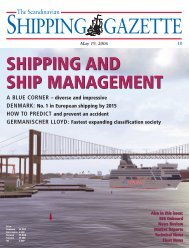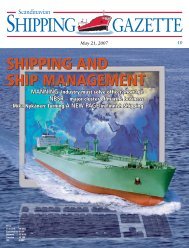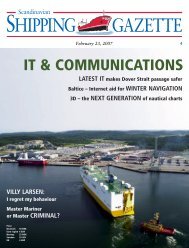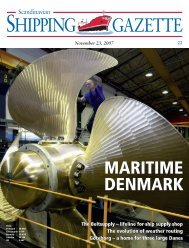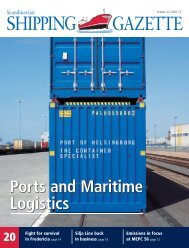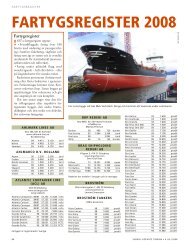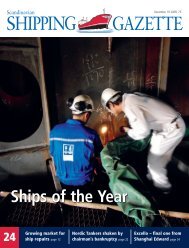SSG No 10 - Shipgaz
SSG No 10 - Shipgaz
SSG No 10 - Shipgaz
- TAGS
- shipgaz
- shipgaz.com
Create successful ePaper yourself
Turn your PDF publications into a flip-book with our unique Google optimized e-Paper software.
SHIPPING AND SHIP MANAGEMENT<br />
Kadri Land with the multinational team of her office.<br />
ship sails under. This is where the crews are<br />
employed.<br />
We are a sales office and our primary<br />
goal is to fill the ships with passengers in<br />
Sweden. An additional function of the<br />
office is to man the vessels under the Swedish<br />
flag.”<br />
Are the passengers using your lines the<br />
same or different?<br />
“Our customers choose voyages for different<br />
purposes. For instance, those travelling<br />
to Turku are mostly interested in the seagoing<br />
experience: the views of the islands,<br />
nice restaurant meals and the other onboard<br />
entertainment. They do not actually disembark<br />
in Turku and simply return the same<br />
way. On the other hand, the people who<br />
travel to Riga tend to be interested in the<br />
destination. The voyage itself is fun as well,<br />
of course, otherwise they would fly.”<br />
You used to be the director of Tallink<br />
AB and you were entrusted with the task<br />
of merging the two Stockholm offices.<br />
What was the most difficult aspect of<br />
doing so?<br />
“We suddenly, and inevitably, had two<br />
of everybody: two secretaries, two marketing<br />
managers, and double the number of<br />
lots of other employees. The problem was<br />
that Swedish legislation in such instances<br />
favours those who have been with the<br />
company longer and dismissals therefore<br />
affect newcomers first and foremost. Silja<br />
employees therefore enjoyed a clear advantage<br />
as Tallink had operated in Sweden for<br />
a much shorter period.<br />
Dismissals are always painful but I<br />
believe the decision should be made at<br />
once, without delay, not two workers one<br />
month and another couple the next. Procrastination<br />
creates more insecurity and<br />
people are no longer motivated to perform.<br />
When you have no choice but to amputate,<br />
you do it all in one go.”<br />
So in essence this finetuned<br />
system protects those<br />
who to some degree lack<br />
initiative or are lazy.<br />
Have any dismissed employees<br />
expressed their frustration through acts<br />
of discontent?<br />
“<strong>No</strong>, they left in a dignified manner.<br />
Naturally they were sad to leave the company<br />
where they had worked for many<br />
years. In some cases it has actually proved<br />
to be a useful experience for them, serving<br />
as a wake-up call of sorts, liberation from<br />
a routine that had lasted for up to twenty<br />
years. Having found themselves in a new<br />
situation, they had to review their abilities<br />
and possibilities. Quite a few of them actually<br />
got better jobs, something they would<br />
have never searched for had they stayed<br />
with our company.<br />
In that sense our dismissals came at<br />
the right time, since they coincided with<br />
a time of great flexibility on the Swedish<br />
labour market. I have not heard of a former<br />
employee who has not found another job.<br />
When we later needed to recruit new staff<br />
and tried to invite some of the former<br />
employees to return to the company, we<br />
were too late, as they had found new jobs<br />
and were satisfied with them. But the period<br />
of dismissals was still a bitter experience.”<br />
You are a Swedish employer and therefore<br />
surely have a lot of dealings with the<br />
trade union. Has it ever been the case<br />
that you were forced to dismiss someone<br />
you needed and kept someone you were<br />
told to retain?<br />
“It has never been that drastic. Some<br />
employees had to go because, for instance,<br />
the new structure had other language<br />
requirements for the position. Certainly<br />
the trade union has played an important<br />
part. You need to meet trade union representatives<br />
not once, but two, three, as many<br />
as ten times to iron out all of the details.<br />
The reality is that the employers usually<br />
get what they want. You have to be able to<br />
argue your points well, explain the reasons.<br />
It is great that someone is there to support<br />
employees: one day we are employers,<br />
the next we could be employees ourselves.<br />
We like it when our interests are protected.<br />
But you’ve got to draw the line somewhere.<br />
Adopting a rigid stance can in fact damage<br />
your company.<br />
When we are obliged to favour those<br />
employees who have been with the company<br />
for many years, some of them will<br />
invariably be those who are not likely to<br />
be employed anywhere else or couldn’t be<br />
bothered going elsewhere. So in essence<br />
this fine-tuned system protects those who<br />
42 SCANDINAVIAN SHIPPING GAZETTE • MAY 16, 2008


